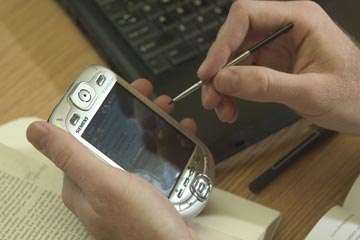
A Pocket PC phone.
Pocket PC phones will be in the hands of about 100 Wake Forest University students this fall as the university begins what may be the nation’s first pilot program to explore potential campus uses for the latest in converged mobile technology.
The pilot program, called MobileU, will explore the ways students are already communicating and find out if one mobile device can meet their needs and enhance academic and student life.
“What we’ve seen over the past two or three years is students moving away from more traditional messaging like e-mail to newer technologies such as instant messaging and text messaging,” said Jay Dominick, chief information officer at Wake Forest. “Student communication patterns are diverging. We want to find out if we can use mobile technology to close that gap, to deliver new things in ways students want to get them.”
The Pocket PC phones in the pilot combine the functions of a cell phone and a mobile computer with wireless access and are equipped with instant messaging, text messaging and various customized software. Participants in the pilot will provide feedback on specific applications, but are also encouraged to come up with their own creative uses for the devices.
The pilot program will focus on three key functions: mobile messaging (such as instant messaging, text messaging); mobile access to information (including a calendar, the campus information network and specialized features such as campus shuttle bus tracking and laundry monitoring); and control over the device (including features such as turning off the ringer during a student’s scheduled class times).
Using voice as the unique way to interface with the device is a key part of the pilot, Dominick said.
Some of the voice-enabled software applications students will test were developed by four interns, including Wake Forest junior Thomas Whaples, working this summer in IBM’s Extreme Blue internship program. One application uses GPS tracking to allow students to ask the Pocket PC phones how many minutes it will take for a campus shuttle bus to arrive at their stop. Another application, LaundryView, allows students to use voice commands to find out how many washers and dryers are currently in use to avoid wasting time in the laundry room waiting for available machines.
Herecast, a location-based software application that will be on all of the pilot program’s Pocket PC phones, allows messages to be “left” in a particular physical space and accessed through the wireless network by anyone who enters that space. For example, a professor could leave a virtual message describing how a particular painting in a university gallery relates to a class discussion and anyone using the Herecast software could see the message on a PocketPC phone.
About 60 of the pilot participants volunteered for the project. They range from incoming freshmen to seniors.
A group of about 10 students in the pilot program live together in the university’s Technology Quarters, a theme house for those with a special interest in technology. This group will test the PocketPC phones as well as other technology and provide feedback to the Information Systems staff.
Forty-five of the students in the pilot are enrolled in a chemistry 111 class taught by Professor of Chemistry Bob Swofford. The class will help the university figure out potential academic advantages of the devices.
“It will tie in the penchant students already have for messaging,” Swofford said. “We’ll find out if we can improve our ability to contact them and their ability to communicate with each other and if they take advantage of wireless networks and PDA capability.”
Swofford wants to explore what these devices can do to help get students more engaged with course material outside the classroom. He will experiment with sending audio attachments directly to students to preview topics for class or review key points. He will also look for other ways he might get students to stay more connected with their classmates.
Feedback from the students will help the university decide whether or not to consider providing similar devices to all students in the future, Dominick said.
The latest survey of the Pew Internet and American Life Project released in July highlighted the increasing importance technology plays in the daily lives of most teens. Of those surveyed, 45 percent had their own cell phones and 33 percent used text messaging. Sixty-five percent of teens said they used instant messaging and more than 90 percent said they had a computer.
“Somebody’s going to be providing the technology,” Dominick said. “We want to investigate whether we as a university can do it and integrate the technology so that it provides some advantage.”
Known as a technology leader in higher education, Wake Forest was among the first universities in the country to provide laptop computers to its students. For the past four years, the university has been experimenting with mobile computing pilot programs to find out what technology is most useful in an academic environment. This is the first pilot involving the Pocket PC phones and the campus wireless network.
Categories: Campus Life, University Announcement
Headlines
Wake Forest in the News
Wake Forest regularly appears in media outlets around the world.




